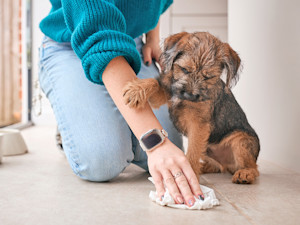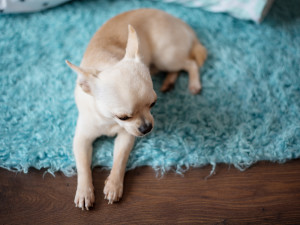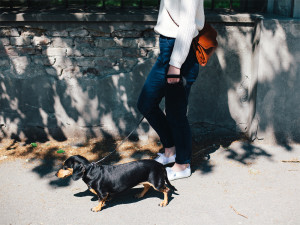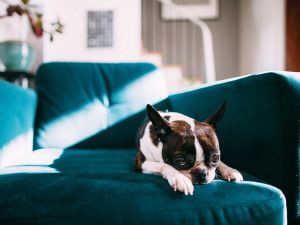Why Does Your Dog’s Pee Smell So Bad?
Ummm, ew.

Share Article
In This Article:
Why Does My Dog’s Urine Smell Bad? Dehydration Urinary Tract Disorders Reproductive Diseases Urinary Retention Kidney Disease Diabetes Improper Diet
As pet parents, we spent a lot of time dealing with our dog’s pee and poop. From obsessing over their walk schedules to analyzing the textures, odors and colors of their excrement, it’s a major part of the job. If your dog’s pee suddenly starts to develop a bad smell, you’ll likely pick up on it right away. It’s important to see a vet if you notice any changes in your dog’s urine including the odor, color, frequency, or signs of discomfort when peeing. Read on to learn about possible causes for malodorous urine.
Why does my dog’s urine smell bad?
Most of the time, you probably don’t even notice if your dog’s urine has a smell because it’s not very strong, and, hopefully, they only pee in their designated spot. However, if all of a sudden you notice your dog’s urine smells especially strong or has a bad odor that seems to burn your nose, you’ll want to pay close attention. This can be a sign of a medical problem and should put you on alert to look for other changes like more frequent urination, blood in the urine, signs of pain, or other signs of illness. Any of these signs should be checked out by a veterinarian.

Your vet will start with a physical exam and will likely recommend tests like routine bloodwork and a urinalysis to analyze your dog’s urine. Your dog may need additional tests, based on what your vet discovers in order to make a diagnosis and targeted treatment plan. Some of the most common causes of bad-smelling urine include dehydration, Urinary tract infections (UTIs), and reproductive conditions. In all cases, it’s important to make sure your dog always has access to clean water and has plenty of opportunities to go pee every six to eight hours, depending on their age and other needs.
Dehydration
Dehydration causes urine to be more concentrated in healthy animals, leading it to have a stronger smell. Dehydration occurs when fluids are lost from the body and are not adequately replaced. This can happen in sick dogs who are losing fluids through vomiting, diarrhea, or even excessive drooling or runny noses. If they aren’t eating and drinking enough to replace those fluids, they can become dehydrated. It can also occur when dogs are very active or are outside in the heat without enough water to replace their losses.
Most dogs will also have their most concentrated urine first thing in the morning after a full night’s sleep and likely their longest stretch without food or water. This means that their first pee of the morning may also smell stronger than it does at other times throughout the day. When there is a lack of water in the body, dogs will urinate less often, in smaller amounts, and it will be very dark, concentrated, strong-smelling urine. Severe dehydration can also cause serious medical complications and should be treated as an emergency. When a dog becomes extremely dehydrated, they may stop urinating all together. This is a sign that your pet needs immediate medical attention.
Urinary tract disorders
Problems within the urinary tract can also lead to foul-smelling pee and are commonly accompanied by other physical changes. UTIs are a common cause of changes in dogs’ urine. These are most commonly bacterial infections and are usually accompanied by other signs as well. UTIs often have an underlying cause, such as bladder stones, diabetes, congenital malformations, and/or dilute urine, so it is important to do a thorough work-up on dogs with UTIs. It’s especially necessary if they have them repeatedly. Other signs of UTIs include:
Having accidents in the house: UTIs cause a lot of inflammation with the urinary tract and this leads dogs to feel like they have to pee more frequently and with urgency. As a result, even the most housebroken dog may have urinary accidents if they have a UTI.
Changes in the color of the urine: Dogs with UTIs often have blood or pus in their urine which can make the urine look cloudy, dark brown, or red.
Excessive licking of the genitals: UTIs are painful and dogs may express their pain by licking their genitals frequently, hiding, whimpering, or avoiding people or other dogs.
Straining to urinate: Dogs with urinary tract problems often strain to urinate for numerous reasons. They may feel the urge to urinate frequently but may not actually have much urine in their bladder, leading them to strain without much pee coming out. Other times, straining could be due to a partial or complete blockage of their urethra. This can occur from swelling, bladder stones that are small enough to get stuck in the urethra, or even tumors that can grow within the bladder or urethra. In all cases, if your dog is straining to pee but not actually passing any urine, this is a medical emergency that requires immediate attention.
Reproductive diseases
In some cases it may be difficult to differentiate urinary problems from certain reproductive problems since the anatomy overlaps in the genital region. For example, female dogs can develop conditions like vaginitis, uterine infections called pyometras, or tumors of the reproductive tract. These conditions can also cause bad odors, discomfort, and may interfere with normal urination.
For male dogs, prostate infections or an enlarged prostate can also cause changes in the urine as well as problems with urination. Many of these conditions can be prevented by spaying and neutering dogs.
Urinary retention
Urinary retention, or when a dog holds in pee for long periods of time, also causes urine to smell bad. The most common reason for this would be when dogs have to hold in their pee overnight or for a long time in between walks. Other times, medical conditions can make it difficult for dogs to fully empty their bladder. This includes spinal or nerve damage that affect the tail, hind legs, or bladder.
There are other reasons a pet may retain urine such as painful conditions that make it difficult for dogs to walk or posture to pee, medications like opioids that cause urinary retention, or blockages of the bladder or urethra. Any dog who is straining to pee or does not pee at all for more than eight hours should be seen by a vet right away. For healthy dogs, frequent walks are important to maintaining a healthy urinary tract.
Kidney disease
Certain kinds of kidney disease can directly or indirectly lead to bad-smelling urine. Kidney infections, known as pyelonephritis, can directly cause the urine to smell bad as a result of bacteria in the urinary tract. Other times, dogs with decreased kidney function due to chronic kidney disease may be predisposed to urinary tract infections, which can also cause a bad odor.
This is because as kidney disease advances, the kidneys lose their ability to reabsorb water and concentrate the urine. The urine becomes more dilute, which makes it easier for bacteria to thrive and cause infections. Other signs of kidney disease include:
Increased thirst: Dogs with kidney disease lose more water in their urine, so they need to drink more to replace those losses.
Increased peeing: As the kidneys become less effective at reabsorbing water, the urine becomes more dilute, which often means that dogs urinate larger amounts, it looks more clear, and they may need to pee more often, too.
Loss of interest in playing or activities: Dogs with advanced kidney disease often feel lethargic, weak, and may become dehydrated, making them less active and playful.
Vomiting: As kidney disease worsens, certain waste products like urea build up within the body, causing additional problems like nausea and irritation of the digestive tract.
Decreased appetite: Lethargy, nausea, and dehydration can make dogs feel crappy and lead to a loss of appetite. This can exacerbate problems like dehydration and lead to weight loss.
Diabetes
Diabetes is another condition that is often associated with changes in the urine. Dogs with undiagnosed or uncontrolled diabetes often have sugar in their urine and their urine is dilute. Some people with sensitive noses may be able to smell a difference in their dog’s urine. This can be exacerbated by the fact that dilute urine and sugar in the urine create an ideal environment for bacteria, leading to UTIs in many diabetic dogs.
Once an infection takes hold, the urine will be more likely to have a bad odor. Some of the other signs of diabetes in dogs include:
Increased thirst and urination: Diabetic dogs have dilute urine, which leads them to pee more often and in larger amounts. As a result, they need to drink more water to keep up with their losses.
Increased appetite: Uncontrolled diabetics may seem hungry all the time. This is because their bodies are not using nutrients effectively. Without insulin, their cells cannot take up sugar for energy.
Weight loss: Diabetic dogs may lose weight even if they seem to be eating a lot. This is because they are not using their food effectively to fuel their bodies. Without insulin, their cells enter a starvation mode and start burning muscle and fat for fuel, leading to weight loss.
Cataracts: Some diabetic dogs suddenly develop cataracts. It can affect one or both eyes and can lead to blindness without surgery to restore their vision.
Improper diet
Depending on what a dog is eating, it can affect many aspects of their urine Diet’s amount of salt r, or protein will affect the composition of the urine and can change the smell of the urine, too., Oxalates,a compound found in certain foods, can also be predisposed some pets to form bladder stones, which in turn can lead to urinary tract infections and bad-smelling pee.
Dogs who have a history of urinary problems, like bladder stones, may need to eat a prescription diet to prevent the formation of more stones in the future. Dogs with chronic medical conditions like kidney disease or diabetes may also need to eat a therapeutic diet. Be sure to speak with your vet to find the best diet for your dog’s medical conditions.
Bottom line
Many conditions can cause bad-smelling urine in dogs including UTIs, dehydration, and urinary retention.
It is very important to see a vet if you notice your dog’s urine has a bad odor, or other urinary problems.
Not all urinary problems are preventable, but some steps you can take to keep your pup healthy include spaying and neutering, providing access to fresh water at all times, feeding your dog a balanced diet, and offering frequent walks to relieve themselves.
References
Gallagher, A., “Are Routine Urine Cultures Needed for Diabetic Dogs?opens in new tab” Clinician’s Brief, June 2023.
Granger, N., et al., “Bladder and Bowel Management in Dogs with Spinal Cord Injuryopens in new tab,” Frontiers in Veterinary Science, vol. 7, 10 November 2020.
Van Vertloo, L., “Renal Dysfunction in Dogs and Catsopens in new tab.” Merck Veterinary Manual, March 2025.
Yadav, SN, et al., “Urinalysis in dog and cat: a reviewopens in new tab.” Veterinary World, vol. 13, no. 10, 12 October 2020, pp: 2133-2141.

Dr. Amy Fox, DVM
Amy Fox, DVM is a small animal veterinarian in New York City with over thirteen years of experience in a mixture of general practice, emergency medicine, and shelter medicine. A lifelong animal lover, Dr. Fox studied biology in college and then worked as a veterinary nurse before pursuing veterinary school at Cornell University. Her expertise includes surgery, dentistry, and management of chronic conditions, and she is interested in toxicology, pain management, nutrition, care of senior pets, and educational outreach. Dr. Fox also enjoys writing about veterinary medicine and teaching, and her work has previously appeared in Spruce Pets. In her free time, she loves to cook, garden, go for long runs, and hang out with her goofy mixed-breed dog May, who provides never ending comic relief!
Related articles
Why Does My Dog Pee When Excited? Experts Explain What to Do About It
You’re happy to see them, too. But you’d be even happier if they didn’t create a mess.
![Woman walking her small black dog outside on leash.]()
Do Small Dogs Pee More Often?
Research shows that little dogs may feel the need to scent mark more frequently than big dogs.
Does Dog Pee Kill Grass?
It depends...
Why Is My Dog Peeing So Much?
Seriously, when will it end?
![A couple walking their two Beagle dogs on leashes on a fall day]()
Why Do Dogs Pee on Other Dogs (and Leashes) During Walks?
Is your dog guilty of this offense?
![A Boston terrier hanging out in a teal blue chair]()
SOS: Why Does My Dog Pee When I Pet Them?
Keep the faith; you can fix this pee-action.







